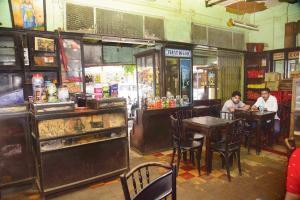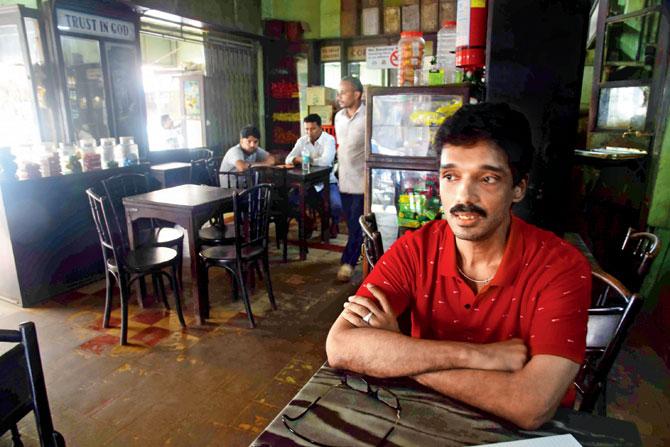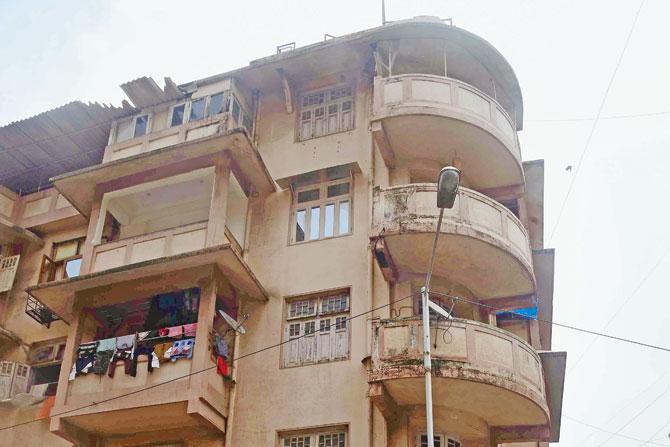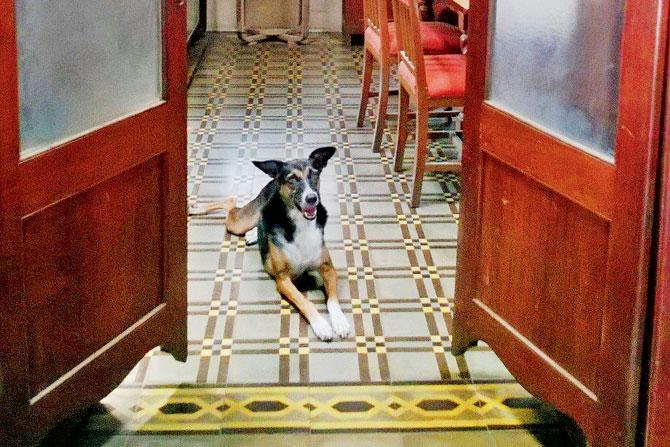That's the literal translation of Cafe de la Paix, a historic coffee shop in Paris, which inspired an Irani cafe in Girgaum. We bring you the story of this hidden gem, where time has stood still for 80 years

The interiors of Cafe Dela Paix
A little over 80 years ago, a man — there is ambiguity here, but he was possibly a Mr Pratap — returned wide-eyed to Bombay after a trip to Paris. The mesmerising splendour of the European capital city had left an indelible mark on his psyche. So much so, that he decided on a French name, Bellevue, or "beautiful view", for a residential property he was constructing. This building was close to the Royal Opera House in Girgaum. And when an Irani gentleman approached him with a proposal for a café in a vacant corner within that property, Mr Pratap, again, made a request for it to be named after a historic coffee shop he had been to in Paris.
That place was called Cafe de la Paix.
ADVERTISEMENT
But let's put the era we are talking about here in context first before we move any further in time. Bombay, back then, was a work in progress (as it still is). It was an amalgam of horse-drawn carriages sharing street space with the country's first automobiles. Tram tracks zig-zagged across parts of the south. Dhoti-clad labourers ferried goods on the roads that helped build the fortunes of traders wearing sola hats. People were making their way here from different parts of the country, taken in by an emerging sense of commerce. And the initial Irani immigrants to the city were looking for ways of making a living, having decided that Bombay is the new home they would settle in.
One such way they found was to open cafés in street corners. The reason was simple enough — since such spots weren't vastu-compliant, Hindus considered them inauspicious for business. But the Iranis had none of that superstitious hanky-panky. So, sensing an opportunity, they took over these plots en masse, converting them into part-café and part-convenient store, with a décor that was distinctive of the community, be it in the form of checkered tablecloths or portraits of Zarathustra, their prophet.

Gustad Dilshaw Irani Pics/ Atul Kamble
And Gustad Dilshaw Irani — the Irani gentleman who did accede to Mr Pratap's request of naming his establishment "Café Dela Paix" — stuck to that memo, minus the checkered upholstery. He set up glass cabinets that displayed his wares all across the eatery, with a framed picture of Zarathushtra placed above the counter for cash transactions. Some of these cabinets were embossed with floral designs typical to his community, with a board saying, "Trust in God" symbolic of his belief system. The menu was sparse — chai, bun-maska, omelettes and bhurji. The tables and chairs strewn around the place were similarly no-frills, but sturdy. And soon enough, business was booming, especially after the neighbourhood transformed into a hub for automobile spare parts and the diamond trade.
By then, the original proprietor's son, Dilshaw Gustad Irani, had taken over the reins. Irani, as was customary of other such cafés, kept his doors open for customers regardless of class, religion or creed. So, diamond merchants who got off at a tram junction that ended right outside the café could easily sit next to a table with a coolie nursing a cup of tea. And this led to a sense of inevitable goodwill being conferred upon the gentleman. People, no matter who they were, felt accepted at Café Dela Paix.

Villa Bellevue with Cafe Dela Paix in the ground-floor corner
But gradually, the times started changing. The trams became defunct. The diamond business moved to Bandra Kurla Complex. The government set up a no-smoking policy inside eating houses. And the number of customers consequently started dwindling. So, what does one do in a situation like this? Spruce up the décor and raise the prices, you might think. But, Irani did none of that. He let the café that his father had built remain exactly the way it had been since inception. In fact, it's almost as if we have zipped back in time when we visit the place ourselves on a Friday morning.
The glass cabinets show the stains of wear and tear. Hungry termites have eaten away at the wooden panels. The embossments show no signs of ageing, though, but that's only because they are made of pure gold. And the general air of the place is such that if we had shut ourselves in for a while with all the doors closed, we wouldn't be surprised if we walked out into a world where horse-drawn carriages were still the order of the day and people roamed around in topis and dhotis.
And that's why places like Cafe Dela Paix are such an integral stitch in the fabric of this city. Look at the next half-finished high-rise you spot and ask yourself, how greedy are we for change, and at what cost to history are we willing to accept it? Who the hell has the time for such answers, you might counter-question. Well, Gustad Dilshaw Irani — the third-generation proprietor of Café Dela Paix who shares the same name as his grandfather — does. He's the one who recounts its story for us (after a fair bit of coaxing, it must be said). And the 46-year-old tells us that he, like his father, wouldn't refurbish the place even if you gave him sacks full of money. "This place is an heirloom for the city, and I wouldn't want to take it away from it," he says, voicing a sentiment that seems as incongruous to our era as a chunk of diamond would be in a shop selling spare parts for automobiles.
Stars drop by
A flat in Indira Nivas (in pic, below), a building down the lane from Cafe Dela Paix, is where yesteryear actress Rekha Sabnis used to live. It's where parts of the film Bhumika starring Smita Patil was filmed. Sabnis was a regular visitor to the cafe, with Patil also having dropped in there from time to time. And Sahitya Akademi-winning writer Kiran Nagarkar is another famous face to have frequented the place.

Catch up on all the latest Crime, National, International and Hatke news here. Also, download the new mid-day Android and iOS apps to get latest updates
 Subscribe today by clicking the link and stay updated with the latest news!" Click here!
Subscribe today by clicking the link and stay updated with the latest news!" Click here!







